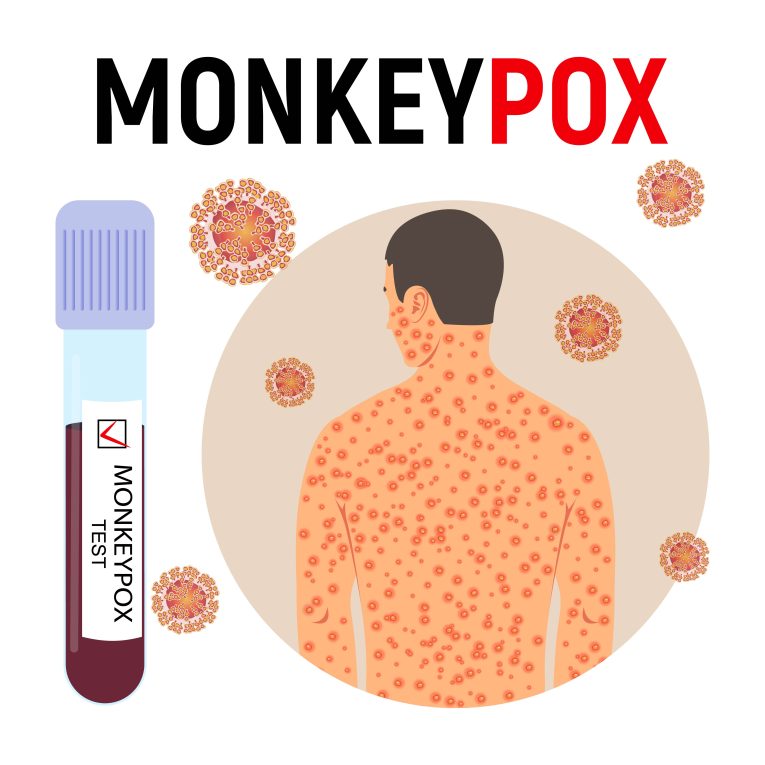Mpox, also known as monkeypox, is an infectious disease caused by the monkeypox virus, a species of the genus Orthopoxvirus. The virus and the virus that causes smallpox are part of the same family.
Mpox disease spreads from animals to humans; it is zoonosis. The animals believed to spread this disease are rats, monkeys, squirrels, primates, prairie dogs, pigs, hedgehogs, and mice. They are found in the African regions where mpox was once common.
The current epidemic mainly spreads through human-to-human transmission. It spreads via respiratory droplets, fomites, and contact with infected lesions. Recent analysis has found high viral loads in bodily fluids, like saliva, urine, semen, and faeces. They are also in swabs from the throat and rectum. This suggests that sexual transmission plays a significant role in the spread of the monkeypox virus.
Mpox transmission:
Mpox transmission can occur when a healthy person contacts infected people or animals in these ways:
- Contact with infected persons through touch, kissing, or sex.
- Contact with infected animals when hunting, skinning, or cooking them.
- Contact with infected objects, such as contaminated sheets, clothes, or needles.
- Infected pregnant mothers may pass the monkeypox virus on to their unborn babies.
Mpox signs and symptoms:
Mpox symptoms usually begin within a week but can appear 1–21 days after exposure. The symptoms primarily last 2–4 weeks but may last longer in individuals with a weak immune system.
The mpox symptoms are:
- Fever
- Rash
- Headache
- Sore throat
- Muscle aches
- Back pain
- Low energy
- Swollen lymph nodes
People vulnerable to mpox complications are those with weak immune systems, pregnant women, and children.
Mpox diagnosis:
To diagnose monkeypox disease, a healthcare provider can take a sample from a rash and send it for PCR testing. They may also take a blood sample to check for the virus or antibodies.
Before tests, the provider might need to rule out other causes of skin rashes, such as chickenpox, measles, or syphilis. Additionally, they may test for sexually transmitted infections like HIV and syphilis.
Typically, the results will be ready within a few days. While waiting for the results, it’s crucial to take preventive measures to prevent contracting or transmitting the virus to others.
Mpox treatment and vaccine:
When treating mpox infection, the primary goal is to effectively address the rash, alleviate pain, and minimise the risk of complications. Providing early and comprehensive care is crucial for managing symptoms and preventing potential issues from arising.
By quickly treating the rash, you can manage symptoms. This will ease discomfort and lower the risk of complications.
Receiving an mpox vaccine can significantly reduce the risk of infection. It is recommended to receive the vaccine within 4 days of contact with an individual who has mpox, or within up to 14 days if symptoms have not yet manifested.
It is recommended that people at high risk receive the MPOX vaccine, particularly during an outbreak, to prevent infection. This includes:
- Healthcare workers are at risk of exposure.
- Men who have sex with men
- Individuals with many sexual partners
- Sex workers
Self-care and prevention:
Many people with mpox infection will heal within 2–4 weeks. Here are some steps to take to alleviate symptoms and avoid infecting others:
Do-
- Stay home and in your room if possible.
- Wash hands frequently with soap and water or hand sanitiser, especially before or after touching sores.
- Wear a mask and cover any lesions around others until your rash is healed.
- When you’re alone, you can keep your skin dry and uncovered.
- Remember to avoid touching items in shared spaces and frequently disinfect shared areas.
- Use saltwater to rinse mouth sores.
- Prefer taking sitz baths or warm baths with baking soda or Epsom salts for body sores.
- Remember to take over-the-counter medications for pain and fever, such as paracetamol (acetaminophen) or ibuprofen.
Do not-
- Avoid popping blisters or scratching sores, as this can slow down the healing process, spread the rash to other body parts, and cause sores to become infected.
- Also, refrain from shaving areas with sores until scabs have healed and new skin has formed, as this can spread the rash to other body parts.

